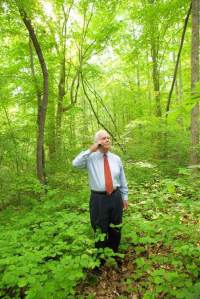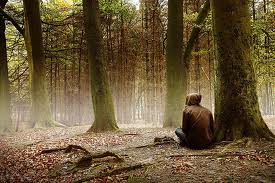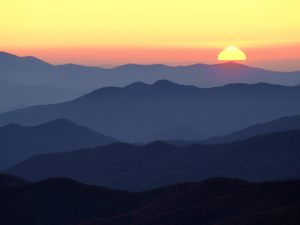Two weeks ago my cousin Rachel got lost in the wilderness. She was visiting a friend in the Smoky Mountains of Tennessee. Rachel went for a hike in the morning by herself. She walked a long way into the wilderness, and at some point she paused to look around, realizing that she didn’t recognize any of the landmarks. Somehow Rachel had strayed unwittingly from the trail. At an elevation of six thousand feet in late November, it’s chilly at noon, and by the time the sun begins to dip below the Western lip of the mountains, it turns stark cold. Rachel had no food. She wore no heavy coat. She began to panic, and she kept walking, sometimes in circles, always farther and farther into the wilderness.
By nightfall, it was clear that Rachel was missing. Search parties were dispatched. They had to zigzag their way up and down the mountains, walking difficult terrain, fording icy streams, and climbing steep slopes. Searching for a single person in that huge range was like searching for a needle in a haystack. There was no straight way to get to her, because she kept moving. It was frightening for those who love Rachel, and it was frightening for Rachel herself.
Rachel wasn’t discovered until the next morning. By then she had hypothermia and had to be airlifted by helicopter to a hospital in Chattanooga.
This story has a happy ending. Rachel will be o.k. But many like it do not end well. Statistics show that in a recent year seven hundred forty-two Americans died from exposure to cold[i], many of whom were lost outdoors, in some variety of wilderness.
Anyone who has ever been a Cub Scout, or taken hunter safety, or had a conscientious grandfather take him camping has at some point learned the bedrock rules for what to do if you’re lost in the wilderness: S.T.O.P. It’s an acronym. Wanting to refresh my own memory, I consulted the web site of online camping coach “The Hiking Dude.”[ii]
S: Stop. Quit moving. With each step, you have a seventy-five percent chance of walking farther into the wilderness. As the Hiking Dude says, “Sit down; take a drink of water; eat a handful of trail mix.”
T: Think. “Go over in your mind how you got where you are.” What led you here? Where were your missteps? What poor decisions did you make along the way, and what warnings did you ignore?
O: Observe. Get out your map. Get out your compass. Let these trustworthy tools orient you. Determine what direction you’re facing and give clear consideration to whether or not it’s the direction you want to continue going.
P: Plan. When you are truly lost in the wilderness, this means staying where you are, keeping up your strength, and making it as easy as possible for people to find you. Drink water and eat whatever food is at hand. Call out for help periodically, so searchers can hear you. Build a fire for warmth and to attract those walking through the woods. In other words, do everything you can to make their paths to find you straight.
In those days John the Baptist appeared in the wilderness of Judea, proclaiming, ‘Repent, for the kingdom of heaven has come near.’ This is the one of whom the prophet Isaiah spoke when he said, ‘The voice of one crying out: “In the wilderness prepare the way of the Lord, make his paths straight.”’
Often, when this passage is read or preached during Advent, the emphasis is upon us straightening out our lives, on us getting our act together, on us solving the dilemmas in which we find ourselves, all so that when Jesus arrives our path to him will be straight, and we’ll be ready to meet him.
But that is, according to the Christian way of seeing the world, a lot like continuing to walk once we’ve discovered that we’re lost in the woods. That sort of bootstraps self-help is liable only to move us farther and farther into the wilderness of our lives.
Consider the businessman who embezzles from his company and then takes a bit more, and a bit more, just until such time (he tells himself) that he can square his personal debts. In his mind he’s struggling, with a meandering and mixed-up sense of virtue, to get back to good, at which time he really does plan on paying his company back. And farther into the wilderness he walks.
Or consider the woman who decides on one pressure-laden day to have her six o’clock cocktail at 3 p.m. Not long after, when she knows how hectic the afternoon will be with kids and homework and sports, she orders the extra glass of wine at lunch. And some weeks after that—just to ease her nerves for a job interview—she decides to have a quick shot of vodka before leaving the house. The alcohol, she says, is just to help her deal constructively and effectively with life around her. But somehow she skips the trail and ends up in a frightening place where none of the landmarks are familiar.
Or consider the teenager who so desperately wants to be accepted, to feel good about himself, that in a group of friends he throws one friend under the bus in order to get a laugh from the others. He offers the most sarcastic barbs on Facebook and Instagram, always getting dozens of likes on his posts, often at the expense of kids whose wits may not be as lightning fast as his own. He feels great about his social standing, until bedtime when the lights are turned out and there’s no iPhone between himself and his conscience. And he shivers as the temperature seems to drop in the wilderness.
In our lives, as in the literal woods, once we’ve strayed from the well-marked trail, our attempts to find the path again through our own efforts most often merely move us circle-by-circle deeper into the wilderness, where we become hopelessly lost.
What, then, could John the Baptist possibly mean today when he says, “In the wilderness prepare the way of the Lord, make his paths straight”? Well, notice that John doesn’t counsel us to move toward Jesus at all. He certainly doesn’t suggest to us that we blaze a new trail. It’s not paths we are to walk that John tells us to prepare. What we are to ready are the paths Jesus will walk to find us. And the only clue John gives us about how to do that is the single word “Repent.”
Repentance is the English rendering of the Greek word metanoia, and it means “a change of mind” or, we might say, “a change of heart,” a “reorientation of the soul.” And what does that look like? I actually think it looks a lot like the advice of the Hiking Dude. It means, first of all, stop moving your life in the same direction. You’ll only get more lost.
Repentance means thinking honestly and clearly, resisting the compelling desire to self-deceive. Ask the open-eyed questions of your life that you would ask in the woods: How did you get so lost? What decisions led you into the wilderness? What warnings did you ignore?
Repentance means observing with the most trustworthy compass and maps you have—your true friends and loved ones, the wisdom of the scriptures, sages and counselors ancient and modern—the wrong direction your life has been heading. Name it, and say to yourself that you no longer want to go that way.
Repentance means remembering to nourish yourself with food that gives sustenance. A steady diet of the bread and wine of the Eucharist is a good place to start.
And finally, most importantly, repentance means doing those things that make God’s path to finding you as short and straight as possible. So long as we are moving in frenetic, panicked circles, we are difficult to find and difficult to reach. So rest. Light a warming fire in your heart by praying for God’s presence and God’s peace. Call out to God, sending the signal flares that you’re ready to be found. And be still in your life, and quiet.
The one who is lost cannot find himself. This Advent, as we prepare for the Lord’s return, do the things of repentance and make the path of the Lord straight. And God will hurry along the trail to draw you from the wilderness into light.


Awesome article!! Reading this after just getting lost while on a hike. But found the way after an hour.